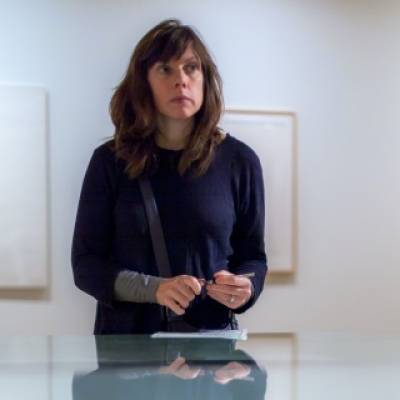Podcast: Slade School of Fine Art Admissions Special
Kate Bright from the Slade School of Fine Art walks ATE podcast host Roberta Livingston through the Slade School's admission process.

6 November 2023
Image credit: UCL Imagestore
TRANSCRIPT
ROBERTA LIVINGSTON
Hello and welcome to ask the expert where you ask the questions and UCL's finest experts answer them. I'm your host, Roberta Livingston, a schools engagement assistant at UCL East and today my guest is Kate Bright from the Slade School of Fine Art who will not only be answering the question can you do an art foundation course without an A level in art, but also providing some general admissions advice when applying for Slade. Let's hear what Kate has to say.
KATE BRIGHT
Well, hello, my name's Kate Bright and I'm a painter, but I'm also head of the first year at the Slade School of Fine. Art in London. Which is and it's part of UCL. One of the things that we get asked a lot is whether you need to do an A level art to go and study [art] at foundation or degree level. And the answer is you don't. What we're looking for in particular and what a foundation course will also be looking for is you to submit a portfolio of your work. So you might have done all sorts of different A levels but been drawing or painting or making or recording sound or video or or dancing and. And filming yourself and all of those kind of things could be put into a portfolio to be shown for a foundation course. You might think I haven't followed the A level syllabus, will that matter and it won't matter I think. I think from my perspective, when I'm looking at portfolios, I'm looking for someone who just loves what they're doing and that sort of love is really infectious. When you're looking at something. You can study a foundation course as a British student. For free if you're under the age of 19. On, I think on the end of August on the year that you're studying, of course you can check those details. So if you're going straight from school, you might want to consider that because it's a free qualification and that can help you decide whether you go on to what sort of artistic. Direction. You you will. You'll go in the future. It's quite. A broad. A broad community. And there's lots of different specialist degrees that you could go into from that. So think about that as well and just go to the thing that feels right for you.
ROBERTA LIVINGSTON
And fast forwarding to for example, you've applied. There's an interview process or?
KATE BRIGHT
There's definitely a interview process, yes. For I'll talk about the Slade. Because we don't have a foundation course, we'll take students from school or from foundation, and what we're looking for in the first instance is you to send in a digital portfolio and a lot of people will send them in to us and we have big teams of people looking at the portfolios and then selecting candidates they want to interview. And this year? We're very happy. We're so excited that we're gonna do in person interviews if the candidate can travel to us. And we're really excited about that because we really like, I was gonna say, we like touching your. We like seeing our and meeting the artist in person. That's really exciting. You bring your digital portfolio to the interview. If you get selected and. Would interview you. We asked the same questions for each person and. And after the interview. All of the interview panels get together and we make offers to students who have scored the highest in our rankings. One of the things that you might be thinking about is what would I put in a portfolio? What would that be? And we've got lots of advice and information about that in our frequently asked questions. On the Slade School of final Internet page and you could have a look at that. Really, there isn't a rule here and there isn't something that I could say right now that could help you. Prepare something. We just want to see what you're interested in. We want to see. Your what you find exciting and maybe you have done some projects at at a level and that's sparked your interest in something and you've taken those ideas further. You've done a drawing, you've made a painting, you've painted an object, you made the object, the object's too big. It falls over. We want to see all of that. We wanna see that story we wanna see. Those things document everything, take photographs of everything you make, even the failures, because sometimes they're the things that we talk about the most. Just because you've learned so much from them and. You've this made you make huge sort of progression in in what you you're deciding to do in the future We're interested in your your passions, so show show them to us.
ROBERTA LIVINGSTON
And so there you have it. I hope Kate's advice has helped if you're thinking of applying to slang, and that is the end of the episode. If you wish to submit your own question for an expert to answer, just type in. Ask the expert UCL on your search engine and our website should be the first to pop up till next time. Thank you.
 Close
Close


